used to do和be used to doing区分练习题
- 格式:doc
- 大小:29.00 KB
- 文档页数:3
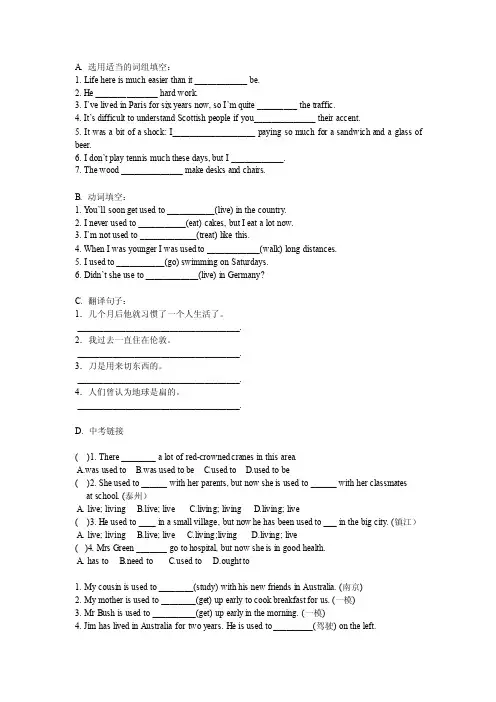
A. 选用适当的词组填空:1. Life here is m uch easier than it ____________ be.2. H e ______________ har d work.3. I’ve live d in Paris for six y ears now,so I’m qui te _________ the tra ffic.4. I t’s diffic ult to und erstand Sc ottish peo ple if you______________ their accent.5. It was a bit of ashock: I___________________ pa ying so mu ch for a s andwich an d a glassof beer.6. I don’tplay tenni s much the se days, b ut I ____________.7. The wood ______________ make desks and chairs.B. 动词填空:1. Y ou’llsoon get u sed to ___________(l ive) in th e country.2. I neve r used to___________(eat) cak es, but Ieat a lotnow.3. I’m not used to _____________(tr eat) likethis.4. W hen I wasyounger Iwas used t o ____________(walk) long dist ances.5.I used to___________(go) swim ming on Sa turdays.6. Didn’t s he use to____________(live) i n Germany?C. 翻译句子:1.几个月后他就习惯了一个人生活了。
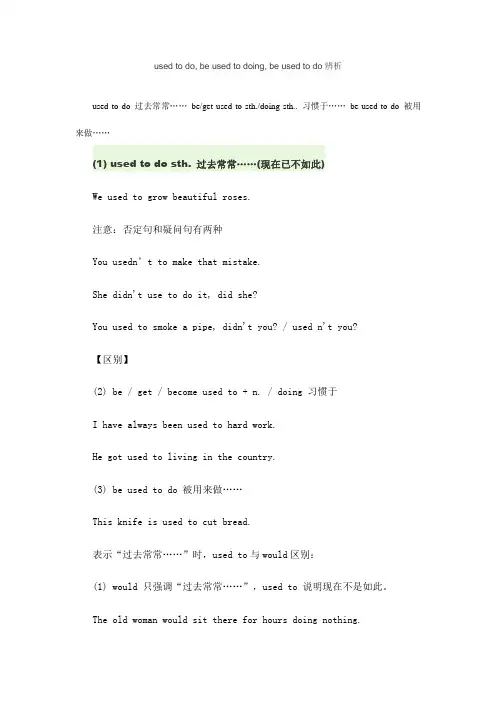
used to do, be used to doing, be used to do辨析used to do 过去常常……be/get used to sth./doing sth.. 习惯于……be used to do 被用来做……(1) used to do sth. 过去常常……(现在已不如此)We used to grow beautiful roses.注意:否定句和疑问句有两种You usedn’t to make that mistake.She didn't use to do it, did she?You used to smoke a pipe, didn't you? / used n't you?【区别】(2) be / get / become used to + n. / doing 习惯于I have always been used to hard work.He got used to living in the country.(3) be used to do 被用来做……This knife is used to cut bread.表示“过去常常……”时,used to与would区别:(1) would 只强调“过去常常……”,used to 说明现在不是如此。
The old woman would sit there for hours doing nothing.(2) would 只接行为动词,used to 可接行为动词和表状态的词。
如:be, like, know, have。
There used to be a temple at the foot of the mountain.A. 选用适当的词组填空:1. Life here is much easier than it ____________ be.2. He ______________ hard work.3. I’ve lived in Paris for six years now, so I’m quite _________ the traffic.4. It’s difficult to understand Scottish people if you______________ their accent.5. It was a bit of a shock: I___________________ paying so much for a sandwich and a glass of beer.6. I don’t play tennis much these days, but I ____________.7. The wood ______________ make desks and chairs.B. 动词填空:1. You’ll soon get used to ___________(liv e) in the country.2. I never used to ___________(eat) cakes, but I eat a lot now.3. I’m not used to _____________(treat) like this.4. When I was younger I was used to ____________(walk) long distances.5. I used to ___________(go) swimming on Saturdays.6. Didn’t she use to ____________(live) in Germany?C. 翻译句子:1.几个月后他就习惯了一个人生活了。
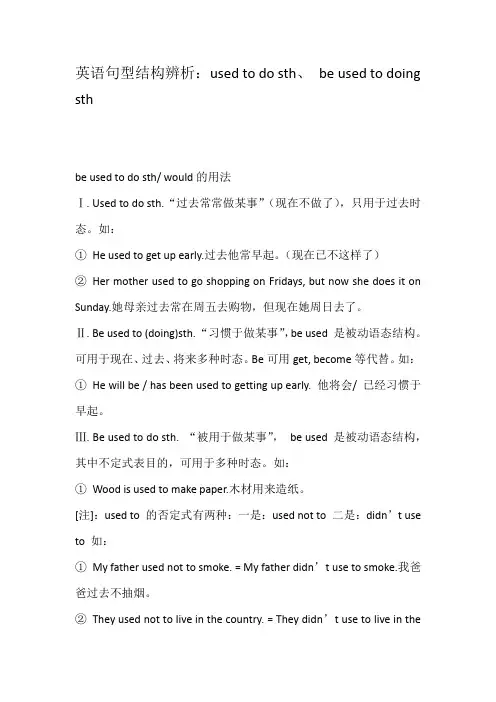
英语句型结构辨析:used to do sth、be used to doing sthbe used to do sth/ would的用法Ⅰ. Used to do sth.“过去常常做某事”(现在不做了),只用于过去时态。
如:①He used to get up early.过去他常早起。
(现在已不这样了)②Her mother used to go shopping on Fridays, but now she does it on Sunday.她母亲过去常在周五去购物,但现在她周日去了。
Ⅱ. Be used to (doing)sth. “习惯于做某事”,be used 是被动语态结构。
可用于现在、过去、将来多种时态。
Be可用get, become等代替。
如:①He will be / has been used to getting up early. 他将会/ 已经习惯于早起。
Ⅲ. Be used to do sth. “被用于做某事”,be used 是被动语态结构,其中不定式表目的,可用于多种时态。
如:①Wood is used to make paper.木材用来造纸。
[注]:used to 的否定式有两种:一是:used not to 二是:didn’t use to 如:①My father used not to smoke. = My father didn’t use to smoke.我爸爸过去不抽烟。
②They used not to live in the country. = They didn’t use to live in thecountry.其疑问式是将used 提前,或添加助动词did.Ⅳ.would 是情态动词,没有象used to那样,有过去和现在的对比。
不能说明是否现在还做不做。
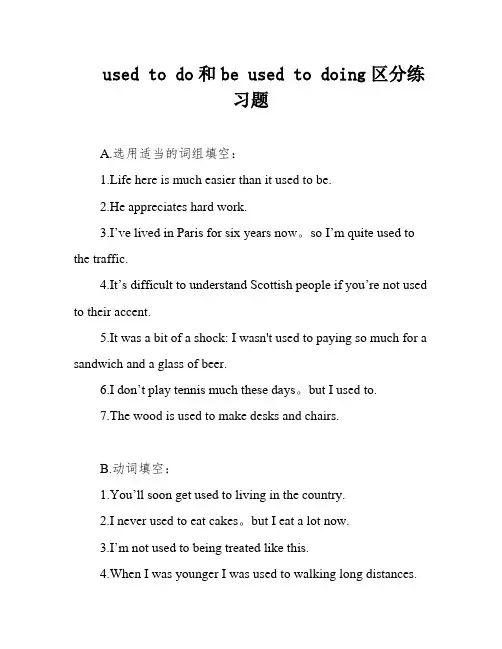
used to do和be used to doing区分练习题A.选用适当的词组填空:1.Life here is much easier than it used to be.2.He appreciates hard work.3.I’ve lived in Paris for six years now。
so I’m quite used to the traffic.4.It’s difficult to understand Scottish people if you’re not used to their accent.5.It was a bit of a shock: I wasn't used to paying so much for a sandwich and a glass of beer.6.I don’t play tennis much these days。
but I used to.7.The wood is used to make desks and chairs.B.动词填空:1.You’ll soon get used to li ving in the country.2.I never used to eat cakes。
but I eat a lot now.3.I’m not used to being treated like this.4.When I was younger I was used to walking long distances.5.I used to go swimming on Saturdays.6.Didn’t she use to live in Germany?C.翻译句子:1.After a few months。
he got used to living alone.2.I used to live in London.3.Knives are used for cutting things.People used to believe that the Earth was flat。
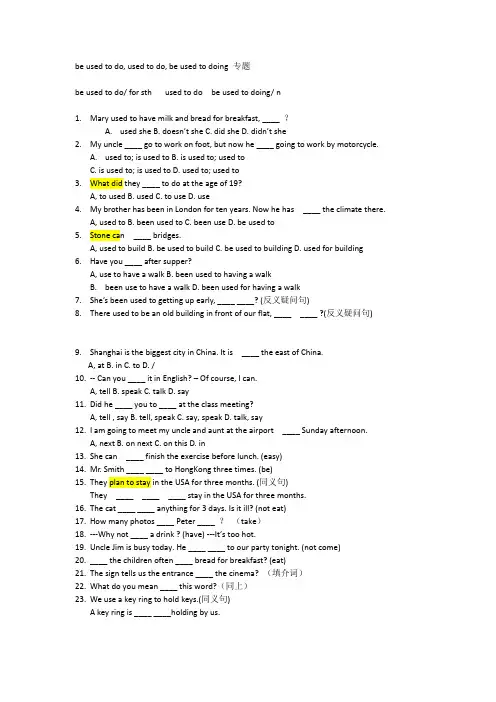
be used to do, used to do, be used to doing 专题be used to do/ for sth used to do be used to doing/ n1.Mary used to have milk and bread for breakfast, ____ ?ed sheB. doesn’t sheC. did sheD. didn’t she2.My uncle ____ go to work on foot, but now he ____ going to work by motorcycle.ed to; is used toB. is used to; used toC. is used to; is used toD. used to; used to3.What did they ____ to do at the age of 19?A, to used B. used C. to use D. use4.My brother has been in London for ten years. Now he has ____ the climate there.A, used to B. been used to C. been use D. be used to5.Stone can ____ bridges.A, used to build B. be used to build C. be used to building D. used for building6.Have you ____ after supper?A, use to have a walk B. been used to having a walkB.been use to have a walk D. been used for having a walk7.She’s been used to getting up early, ____ ____? (反义疑问句)8.There used to be an old building in front of our flat, ____ ____ ?(反义疑问句)9.Shanghai is the biggest city in China. It is ____ the east of China.A, at B. in C. to D. /10.-- Can you ____ it in English? – Of course, I can.A, tell B. speak C. talk D. say11.Did he ____ you to ____ at the class meeting?A, tell , say B. tell, speak C. say, speak D. talk, say12.I am going to meet my uncle and aunt at the airport ____ Sunday afternoon.A, next B. on next C. on this D. in13.She can ____ finish the exercise before lunch. (easy)14.Mr. Smith ____ ____ to HongKong three times. (be)15.They plan to stay in the USA for three months. (同义句)They ____ ____ ____ stay in the USA for three months.16.The cat ____ ____ anything for 3 days. Is it ill? (not eat)17.How many photos ____ Peter ____ ?(take)18.---Why not ____ a drink ? (have) ---It’s too hot.19.Uncle Jim is busy today. He ____ ____ to our party tonight. (not come)20.____ the children often ____ bread for breakfast? (eat)21.The sign tells us the entrance ____ the cinema? (填介词)22.What do you mean ____ this word?(同上)23.We use a key ring to hold keys.(同义句)A key ring is ____ ____holding by us.Keys1-5DADBB 6B 7hasn't she8didn't there9.-12 BDBA13 easily14 has been15 are going to16 hasn't eaten17 have taken18 have19 won't come20 what, eat21 to22 by23 used for。
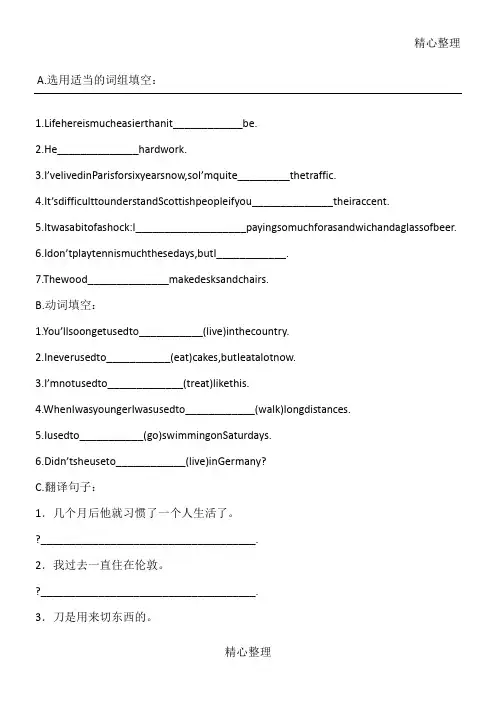
精心整理A.选用适当的词组填空:1.Lifehereismucheasierthanit____________be.2.He______________hardwork.3.I’velivedinParisforsixyearsnow,soI’mquite_________thetraffic.B.3.I’C.1.几个月后他就习惯了一个人生活了。
?_____________________________________.2.我过去一直住在伦敦。
?_____________________________________.3.刀是用来切东西的。
?_____________________________________.4.人们曾认为地球是扁的。
?_____________________________________.D.中考链接(??)1.There________alotofred-crownedcranesinthisarea.usedto正式的否定形式为usedn’t疑问形式为used提前。
Iusedn’ttolikeher.?我未曾喜欢过她。
Usedyoutogothere?您过去可常去那里?Thereusedtobeacinemahere,usedn’tthere?但在口语中或不拘谨的书面语中其否定及疑问形式均与did连用。
Ididn’tusetolikeher.Didyouusetogothere?Thereusedtobeacinemahere,didn’tthere?参考答案:A.B.作要求C.D.raise,而salary就要用raiseraise还有另一个意思是表扬rise也有另一个意思就是起义raise和rise作为动词最根本的区别是,rise是不及物动词,而raise是及物动词。
如,toraisesalaries提高工资Thesunrises.太阳升起这两个词除了提高、升高、抬起等意思外都各自还有其它的用法。
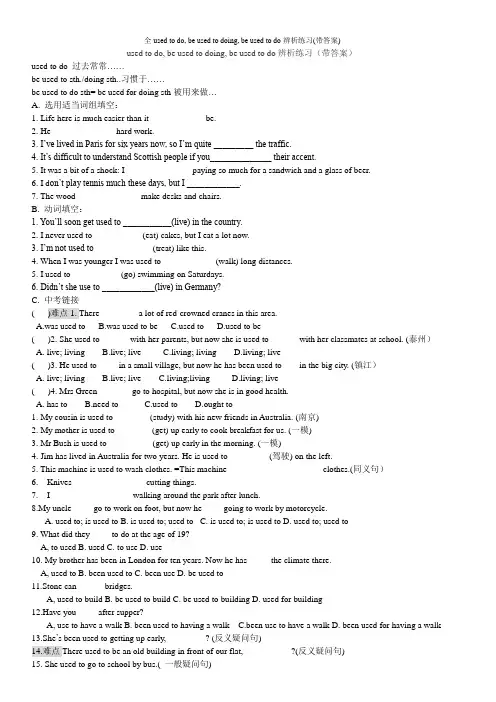
used to do, be used to doing, be used to do辨析练习(带答案)used to do 过去常常……be used to sth./doing sth..习惯于……be used to do sth= be used for doing sth被用来做…A. 选用适当词组填空:1. Life here is much easier than it ____________ be.2. He ______________ hard work.3. I’ve lived in Paris for six years now, so I’m quite _________ the traffic.4. It’s difficult to understand Scottish people if you______________ their accent.5. It was a bit of a shock: I_______________ paying so much for a sandwich and a glass of beer.6. I d on’t play tennis much these days, but I ____________.7. The wood ______________ make desks and chairs.B. 动词填空:1. You’ll soon get used to ___________(live) in the country.2. I never used to ___________(eat) cakes, but I eat a lot now.3. I’m not used to _____________(treat) like this.4. When I was younger I was used to ____________(walk) long distances.5. I used to ___________(go) swimming on Saturdays.6. Didn’t she use to ____________(live) in Germany?C. 中考链接( )难点1. There ________ a lot of red-crowned cranes in this area.A.was used toB.was used to beed toed to be( )2. She used to ______ with her parents, but now she is used to ______ with her classmates at school. (泰州)A. live; living B.live; live C.living; living D.living; live( )3. He used to ____ in a small village, but now he has been used to ___ in the big city. (镇江)A. live; livingB.live; liveC.living;livingD.living; live( )4. Mrs Green _______ go to hospital, but now she is in good health.A. has toB.need toed toD.ought to1. My cousin is used to ________(study) with his new friends in Australia. (南京)2. My mother is used to ________(get) up early to cook breakfast for us. (一模)3. Mr Bush is used to __________(get) up early in the morning. (一模)4. Jim has lived in Australia for two years. He is used to _________(驾驶) on the left.5. This machine is used to wash clothes. =This machine _____________________ clothes.(同义句)6. Knives ________________ cutting things.7. I __________________ walking around the park after lunch.8.My uncle ____ go to work on foot, but now he ____ going to work by motorcycle.A. used to; is used toB. is used to; used toC. is used to; is used toD. used to; used to9. What did they ____ to do at the age of 19?A, to used B. used C. to use D. use10. My brother has been in London for ten years. Now he has ____ the climate there.A, used to B. been used to C. been use D. be used to11.Stone can ____ bridges.A, used to build B. be used to build C. be used to building D. used for building12.Have you ____ after supper?A, use to have a walk B. been used to having a walk C.been use to have a walk D. been used for having a walk13.She’s been used to getting up early, ____ ____? (反义疑问句)14.难点There used to be an old building in front of our flat, ____ ____ ?(反义疑问句)15. She used to go to school by bus.( 一般疑问句)______________________________________________________16.Mary used to have milk and bread for breakfast, ____ ?ed she B. doesn’t she C. did she D. didn’t she相关拓展(初中学生了解即可,不要求运用)used to 正式否定形式为usedn’t 疑问形式为used提前。
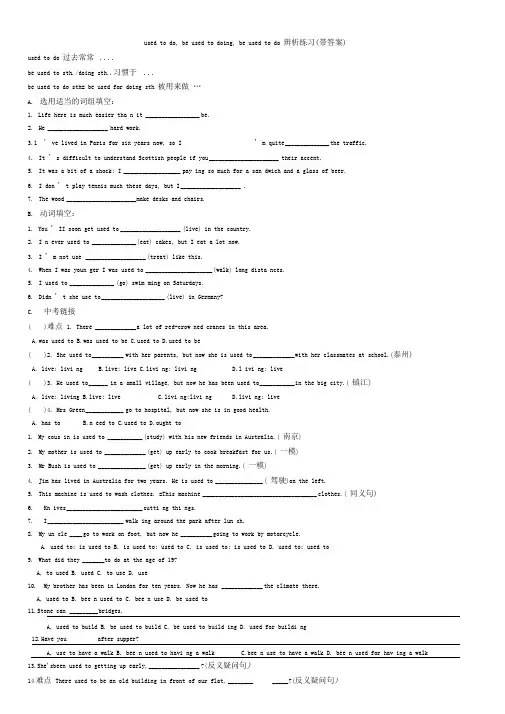
used to do, be used to doing, be used to do 辨析练习(带答案)used to do 过去常常....be used to sth./doing sth..习惯于...be used to do sth= be used for doing sth 被用来做…A.选用适当的词组填空:1.Life here is much easier tha n it _________________ be.2.He ___________________ hard work.3.1 ' ve lived in Paris for six years now, so I ' m quite ______________ the traffic.4.It ' s difficult to understand Scottish people if you ______________________ their accent.5.It was a bit of a shock: I __________________ pay ing so much for a san dwich and a glass of beer.6.I don ' t play tennis much these days, but I ___________________ .7.The wood ______________________ m ake desks and chairs.B.动词填空:1.You ' II soon get used to ___________________ (live) in the country.2.I n ever used to ______________ (eat) cakes, but I eat a lot now.3.I ' m not use ___________________ (treat) like this.4.When I was youn ger I was used to _____________________ (walk) long dista nces.5.I used to ______________ (go) swim ming on Saturdays.6.Didn ' t she use to ____________________ (live) in Germany?C.中考链接( )难点 1. There _____________ a lot of red-crow ned cranes in this area.A.w as used toB.was used to beed toed to be( )2. She used to __________ with her parents, but now she is used to _____________ with her classmates at school.(泰州) A. live; livi ng B.live; live C.livi ng; livi ng D.l ivi ng; live( )3. He used to ______ in a small village, but now he has been used to ___________ in the big city.( 镇江)A. live; livingB.live; liveC.livi ng;livi ngD.livi ng; live( )4. Mrs Green ____________ go to hospital, but now she is in good health.A. has toB.n eed toed toD.ought to1.My cous in is used to ___________ (study) with his new friends in Australia.( 南京)2.My mother is used to _____________ (get) up early to cook breakfast for us.( 一模)3.Mr Bush is used to _______________ (get) up early in the morning.( 一模)4.Jim has lived in Australia for two years. He is used to _______________ ( 驾驶)on the left.5.This machine is used to wash clothes. =This machine ____________________________________ clothes.( 同义句)6.Kn ives ________________________ cutti ng thi ngs.7.I ________________________ walk ing around the park after lun ch.8.My un cle ____ go to work on foot, but now he __________ going to work by motorcycle.A. used to; is used toB. is used to; used toC. is used to; is used toD. used to; used to9.What did they _______to do at the age of 19?A, to used B. used C. to use D. use10.My brother has been in London for ten years. Now he has _____________ the climate there.A, used to B. bee n used to C. bee n use D. be used to13.She'sbeen used to getting up early, ________________ ?(反义疑问句)14难点There used to be an old building in front of our flat, ________ _____ ?(反义疑问句)15.She used to go to school by bus.( 一般疑问句) ______________________________________________________________________________16.Mary used to have milk and bread for breakfast, __________ ? ed she B. doesn'tshe C. did she D. didn Sshe相关拓展(初中学生了解即可,不要求运用)used to正式的否定形式为usedn '疑问形式为used提前。

英语句型结构辨析:used to do sth、be used to doing sth
be used to do sth/ would的用法
Ⅰ. Used to do sth.“过去常常做某事”(现在不做了),只用于过去时态。
如:
①He used to get up early.过去他常早起。
(现在已不这样了)
②Her mother used to go shopping on Fridays, but now she does it on Sunday.她母亲过去常在周五去购物,但现在她周日去了。
Ⅱ. Be used to (doing)sth. “习惯于做某事”,be used 是被动语态结构。
可用于现在、过去、将来多种时态。
Be可用get, become等代替。
如:①He will be / has been used to getting up early. 他将会/ 已经习惯于早起。
Ⅲ. Be used to do sth. “被用于做某事”,be used 是被动语态结构,其中不定式表目的,可用于多种时态。
如:
①Wood is used to make paper.木材用来造纸。
[注]:used to 的否定式有两种:一是:used not to 二是:didn’t use to 如:
①My father used not to smoke. = My father didn’t use to smoke.我爸爸过去不抽烟。
②They used not to live in the country. = They didn’t use to live in the。

be used to do, used to do, be used to doing 专题be used to do/ for sth used to do be used to doing/ n1.Mary used to have milk and bread for breakfast, ____ ?ed sheB. doesn’t sheC. did sheD. didn’t she2.My uncle ____ go to work on foot, but now he ____ going to work by motorcycle.ed to; is used toB. is used to; used toC. is used to; is used toD. used to; used to3.What did they ____ to do at the age of 19?A, to used B. used C. to use D. use4.My brother has been in London for ten years. Now he has ____ the climate there.A, used to B. been used to C. been use D. be used to5.Stone can ____ bridges.A, used to build B. be used to build C. be used to building D. used for building6.Have you ____ after supper?A, use to have a walk B. been used to having a walkB.been use to have a walk D. been used for having a walk7.She’s been used to getting up early, ____ ____? (反义疑问句)8.There used to be an old building in front of our flat, ____ ____ ?(反义疑问句)9.Shanghai is the biggest city in China. It is ____ the east of China.A, at B. in C. to D. /10.-- Can you ____ it in English? – Of course, I can.A, tell B. speak C. talk D. say11.Did he ____ you to ____ at the class meeting?A, tell , say B. tell, speak C. say, speak D. talk, say12.I am going to meet my uncle and aunt at the airport ____ Sunday afternoon.A, next B. on next C. on this D. in13.She can ____ finish the exercise before lunch. (easy)14.Mr. Smith ____ ____ to HongKong three times. (be)15.They plan to stay in the USA for three months. (同义句)They ____ ____ ____ stay in the USA for three months.16.The cat ____ ____ anything for 3 days. Is it ill? (not eat)17.How many photos ____ Peter ____ ?(take)18.---Why not ____ a drink ? (have) ---It’s too hot.19.Uncle Jim is busy today. He ____ ____ to our party tonight. (not come)20.____ the children often ____ bread for breakfast? (eat)21.The sign tells us the entrance ____ the cinema? (填介词)22.What do you mean ____ this word?(同上)23.We use a key ring to hold keys.(同义句)A key ring is ____ ____holding by us.Keys1-5DADBB 6B 7hasn't she8didn't there9.-12 BDBA13 easily14 has been15 are going to16 hasn't eaten17 have taken18 have19 won't come20 what, eat21 to22 by23 used for。
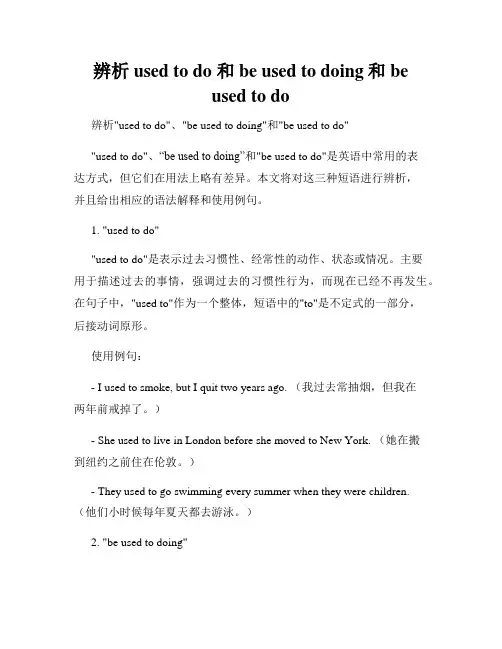
辨析used to do 和be used to doing和beused to do辨析"used to do"、"be used to doing"和"be used to do""used to do"、“be used to doing”和"be used to do"是英语中常用的表达方式,但它们在用法上略有差异。
本文将对这三种短语进行辨析,并且给出相应的语法解释和使用例句。
1. "used to do""used to do"是表示过去习惯性、经常性的动作、状态或情况。
主要用于描述过去的事情,强调过去的习惯性行为,而现在已经不再发生。
在句子中,"used to"作为一个整体,短语中的"to"是不定式的一部分,后接动词原形。
使用例句:- I used to smoke, but I quit two years ago. (我过去常抽烟,但我在两年前戒掉了。
)- She used to live in London before she moved to New York. (她在搬到纽约之前住在伦敦。
)- They used to go swimming every summer when they were children.(他们小时候每年夏天都去游泳。
)2. "be used to doing""be used to doing"是表示对某种经常发生的动作或状况感到习惯、适应或熟悉。
这种表达方式通常用于描述现在或将来的状态。
在这个短语中,"to"是不定式的一部分,后接动词的ing形式。
使用例句:- She is used to waking up early every morning. (她习惯每天早晨早起。
used to do, be used to doing, be used to do 辨析练习(带答案)used to do 过去常常过去常常……be used to sth./doing sth..习惯于…… be used to do sth= be used for doing sth 被用来做…A. 选用适当的词组填空:选用适当的词组填空: 1. Life here is much easier than it ____________ be. 2. He ______________ hard work. 3. I’ve lived in Paris for six years now, so I’m quite _________ the traffic.4. It’s difficult to understand Scottish people if you______________ their accent.5. It was a bit of a shock: I_______________ paying so much for a sandwich and a glass of beer. 6. I d on’t play tennis much these days, but I ____________.don’t play tennis much these days, but I ____________.7. The wood ______________ make desks and chairs. B. 动词填空:动词填空:1. You’ll soon get used to ___________(live) in the country.2. I never used to ___________(eat) cakes, but I eat a lot now. 3. I’m not used t o _____________(treat) like this. 4. When I was younger I was used to ____________(walk) long distances. 5. I used to ___________(go) swimming on Saturdays. 6. Didn’t she use to ____________(live) in Germany?C. 中考链接中考链接( )难点1. There ________ a lot of red-crowned cranes in this area. A.was used to B.was used to be ed to ed to be ( )2. She used to ______ with her parents, but now she is used to ______ with her classmates at school. (泰州)泰州) A. live; living B.live; live C.living; living D.living; live ( )3. He used to ____ in a small village, but now he has been used to ___ in the big city. (镇江)镇江)A. live; living B.live; live C.living;living D.living; live ( )4. Mrs Green _______ go to hospital, but now she is in good health. A. has to B.need to ed to D.ought to 1. My cousin is used to ________(study) with his new friends in Australia. (南京) 2. My mother is used to ________(get) up early to cook breakfast for us. (一模) 3. Mr Bush is used to __________(get) up early in the morning. (一模) 4. Jim has lived in Australia for two years. He is used to _________(驾驶) on the left. 5. This machine is used to wash clothes. =This machine _____________________ clothes.(同义句)同义句)6. Knives ________________ cutting things. 7. I __________________ walking around the park after lunch. 8.My uncle ____ go to work on foot, but now he ____ going to work by motorcycle. A. used to; is used to B. is used to; used to C. is used to; is used to D. used to; used to 9. What did they ____ to do at the age of 19? A, to used B. used C. to use D. use 10. My brother has been in London for ten years. Now he has ____ the climate there. A, used to B. been used to C. been use D. be used to 11.Stone can ____ bridges. A, used to build B. be used to build C. be used to building D. used for building 12.Have you ____ after supper? A, use to have a walk B. been used to having a walk C.been use to have a walk D. been used for having a walk 13.She 13.She’’s been used to getting up early, ____ ____? (反义疑问句) 14.难点There used to be an old building in front of our flat, ____ ____ ?(反义疑问句反义疑问句) 15. She used to go to school by bus.( 一般疑问句)______________________________________________________ 16.Mary used to have milk and bread for breakfast, ____ ed she B. doesn’t she C. did she D. didn ’t she 相关拓展(初中学生了解即可,不要求运用)used to 正式的否定形式为usedn’t 疑问形式为used提前。
used to do, be used to doing, be used to do辨析练习(带答案)used to do 过去常常……be used to sth./doing sth..习惯于……be used to do sth= be used for doing sth被用来做…A. 选用适当的词组填空:1. Life here is much easier than it ____________ be.2. He ______________ hard work.3. I’ve lived in Paris for six years now, so I’m quite _________ the traffic.4. It’s difficult to understand Scottish people if you______________ their accent.5. It was a bit of a shock: I_______________ paying so much for a sandwich and a glass of beer.6. I don’t play tennis much these days, but I ____________.7. The wood ______________ make desks and chairs.B. 动词填空:1. You’ll soon get used to ___________(live) in the country.2. I never used to ___________(eat) cakes, but I eat a lot now.3. I’m not used to _____________(treat) like this.4. When I was younger I was used to ____________(walk) long distances.5. I used to ___________(go) swimming on Saturdays.6. Didn’t she use to ____________(live) in Germany?C. 中考链接( )难点1. There ________ a lot of red-crowned cranes in this area.A.was used toB.was used to beed toed to be( )2. She used to ______ with her parents, but now she is used to ______ with her classmates at school. (泰州)A. live; living B.live; live C.living; living D.living; live( )3. He used to ____ in a small village, but now he has been used to ___ in the big city. (镇江)A. live; livingB.live; liveC.living;livingD.living; live( )4. Mrs Green _______ go to hospital, but now she is in good health.A. has toB.need toed toD.ought to1. My cousin is used to ________(study) with his new friends in Australia. (南京)2. My mother is used to ________(get) up early to cook breakfast for us. (一模)3. Mr Bush is used to __________(get) up early in the morning. (一模)4. Jim has lived in Australia for two years. He is used to _________(驾驶) on the left.5. This machine is used to wash clothes. =This machine _____________________ clothes.(同义句)6. Knives ________________ cutting things.7. I __________________ walking around the park after lunch.8.My uncle ____ go to work on foot, but now he ____ going to work by motorcycle.A. used to; is used toB. is used to; used toC. is used to; is used toD. used to; used to9. What did they ____ to do at the age of 19?A, to used B. used C. to use D. use10. My brother has been in London for ten years. Now he has ____ the climate there.A, used to B. been used to C. been use D. be used to11.Stone can ____ bridges.A, used to build B. be used to build C. be used to building D. used for building12.Have you ____ after supper?A, use to have a walk B. been used to having a walk C.been use to have a walk D. been used for having a walk 13.She’s been used to getting up early, ____ ____? (反义疑问句)14.难点There used to be an old building in front of our flat, ____ ____ ?(反义疑问句)15. She used to go to school by bus.( 一般疑问句)______________________________________________________16.Mary used to have milk and bread for breakfast, ____ ?ed she B. doesn’t she C. did she D. didn’t she相关拓展(初中学生了解即可,不要求运用)used to 正式的否定形式为usedn’t 疑问形式为used提前。
used to do, be used to doing, be used to do辨析ed to do sth. 过去常常做某事,(意思现在不做了)例: I used to get up early and take an hour's walk before breakfast.我过去常常起床很早并且在早餐前散步一小时。
2.be /get used to doing sth ; be /get used to sth .习惯于做某事.(这里的to 是介词.)例: She isn’t used to living in the countryside now.她不习惯在乡下生活。
Are you used to the food here?你习惯吃这儿的饭菜吗?3. be used to do sth. 被用来做某事例: Computers are used to do many things for people now.现在计算机被用来做许多事情。
A. 选用适当的词组填空:1. Life here is much easier than it ____________ be.2. He ______________ hard work.3. I’ve lived in Paris for six years now, so I’m quite _________ the traffic.4. It’s difficult to understand Scottish people if you______________ their accent.5. It was a bit of a shock: I___________________ paying so much for a sandwich anda glass of beer.6. I don’t play tennis much these days, but I ____________.7. The wood ______________ make desks and chairs.B. 动词填空:1. You’ll soon get used to ___________ (live) in the country.2. I never used to ___________ (eat) cakes, but I eat a lot now.3. I’m not used to _____________ (treat) like this.4. When I was younger I was used to ____________ (walk) long distances.5. I used to ___________ (go) swimming on Saturdays.6. Didn’t she use to ____________ (live) in Germany?C. 翻译句子:1.几个月后他就习惯了一个人生活了。
usedtodo,beusedtodo,beusedtodoing辨析刻意练习习题...初⾼中重点常考知识点这是个⾮常容易混淆,⽽且就算记住了,特别容易忘的知识点。
used to do 过去常常做某事be used to do 被⽤来做某事be used to doing 习惯于做某事记忆的⽅法,配套视频中有,点击关注,到主页中可以找到下⾯通过刻意练习,加强巩固,这些习题都是选⾃经典考题1.My grandfather _____ live in the countryside, but now he_____ living in the city.A. used to; used toB. got used to; gets used toC. used to; gets used toD. got used to, used to2.— How does Jane go to school?— She ______ride a bike to school, but now she ______going there by bus.A. used to; is used toB. used to; used toC. is used to; used to3.―I ____ reading English every morning.―Yes, now English is more and more important. English ____ the first language in Englandand some other countries.A. am used to; is used byB. am used to; is used asC. used to; is used byD. used to; is used as4. She____in the big city, but now she____in the small town with her children.A. used to live;is used to livingB. used to living;is used to livingC. used to live;is used to liveD. used to living;is used to live5. She ________ tennis in the school team. Now she is a professional tennis player.A. used to playingB. is used to playC. used to playD. used to playing6. There _______a big river in front of the house but now it has turned into farmlands.A. used to haveB. used to beC. is used to havingD. is used to be7. He____with his family, but now he____on his own.A. used to live; is used to livingB. is used to living; used to liveC. used to live; used to livingD. is used to live; is used to living8. My aunt _______a farmer. Now she’s a worker.A. used to isB. used to beingC. used to beD. uses to be9. ---You like to drink coffee, don’t you?---Yes. But I’m ______ drinking tea, too.A. able toB. similar toC. used toD. ready to10.My uncle ____ go to work on foot, but now he____to work by bike.A. used to ; is used to goB. is used to ; used to goC. used to ; is used to goingD. is used to ; used to going⾼难度11. It is believed that life in the twenty-f irst century is much easier than ________ .A. that used to beB. it is used toC. it was used toD. it used to be12. I _________ in the countryside, but these days I________ in the city.A. used to live; am used to liveB. was used to living; used to liveC. was used to live; used to liveD. used to live; am used to living13.Tom_______ get up late in the past, but now he_______ getting up early.A. be used to; be used to beB. is used to; used toC. used to be; used toD. used to; is used to14.The student found that all her homework was_____ than she_____ in her old school.A. less heavy, used to getB. less heavier, was used to gettingC. less heavier, used to getD. less heavy, was used to getting15.To our great surprise, Bill is no longer the naughty boy _________.A. what he used to beB. that he used to beC. what he was used toD. who he was used to答案CABAC BACCCDDDAB。
used to do, be used to doing, be used to do辨析练习(带答案)used to do 过去常常……be used to sth./doing sth..习惯于……be used to do sth= be used for doing sth被用来做…A. 选用适当的词组填空:1. Life here is much easier than it ____________ be.2. He ______________ hard work.3. I’ve lived in Paris for six years now, so I’m quite _________ the traffic.4. It’s difficult to understand Scottish people if you______________ their accent.5. It was a bit of a shock: I_______________ paying so much for a sandwich and a glass of beer.6. I don’t play tennis much these days, but I ____________.7. The wood ______________ make desks and chairs.B. 动词填空:1. You’ll soon get used to ___________(live) in the country.2. I never used to ___________(eat) cakes, but I eat a lot now.3. I’m not used t o _____________(treat) like this.4. When I was younger I was used to ____________(walk) long distances.5. I used to ___________(go) swimming on Saturdays.6. Didn’t she use to ____________(live) in Germany?C. 中考链接( )难点1. There ________ a lot of red-crowned cranes in this area.A.was used toB.was used to beed toed to be( )2. She used to ______ with her parents, but now she is used to ______ with her classmates at school. (泰州)A. live; living B.live; live C.living; living D.living; live( )3. He used to ____ in a small village, but now he has been used to ___ in the big city. (镇江)A. live; livingB.live; liveC.living;livingD.living; live( )4. Mrs Green _______ go to hospital, but now she is in good health.A. has toB.need toed toD.ought to1. My cousin is used to ________(study) with his new friends in Australia. (南京)2. My mother is used to ________(get) up early to cook breakfast for us. (一模)3. Mr Bush is used to __________(get) up early in the morning. (一模)4. Jim has lived in Australia for two years. He is used to _________(驾驶) on the left.5. This machine is used to wash clothes. =This machine _____________________ clothes.(同义句)6. Knives ________________ cutting things.7. I __________________ walking around the park after lunch.8.My uncle ____ go to work on foot, but now he ____ going to work by motorcycle.A. used to; is used toB. is used to; used toC. is used to; is used toD. used to; used to9. What did they ____ to do at the age of 19?A, to used B. used C. to use D. use10. My brother has been in London for ten years. Now he has ____ the climate there.A, used to B. been used to C. been use D. be used to11.Stone can ____ bridges.A, used to build B. be used to build C. be used to building D. used for building12.Have you ____ after supper?A, use to have a walk B. been used to having a walk C.been use to have a walk D. been used for having a walk13.She’s been used to getting up early, ____ ____? (反义疑问句)14.难点There used to be an old building in front of our flat, ____ ____ ?(反义疑问句)15. She used to go to school by bus.( 一般疑问句)______________________________________________________16.Mary used to have milk and bread for breakfast, ____ ?ed she B. doesn’t she C. did she D. didn’t she相关拓展(初中学生了解即可,不要求运用)used to 正式的否定形式为usedn’t 疑问形式为used提前。
used to do sth/be used to doing sth/be used for doing / be used to do /be used as用法辨析及练习(带答案)school. (泰州)A. live; livingB.live; liveC.living; livingD.living; live( )3. He used to ____ in a small village, but now he has been used to ___ in the big city. (镇江)A. live; living B.live; live C.living;living D.living; live( )4. Mrs Green _______ go to hospital, but now she is in good health.A. has toB.need toed toD.ought to答案:一、1.get used to living ed to eat ed for making/used to makeed to walk5.carrying6.are used by7.are used for working/are used to work8.is used as二、1-4 D A ACThere used to be ...过去曾经有更多习题A. 选用适当的词组填空:1. Life here is much easier than it ____________ be.2. He ______________ hard work.3. I’ve lived in Paris for six years now, so I’m quit e _________ the traffic.4. It’s difficult to understand Scottish people if you______________ their accent.5. It was a bit of a shock: I_______________ paying so much for a sandwich and a glass of beer.6. I don’t play tennis much these days, but I ____________.7. The wood ______________ make desks and chairs.B. 动词填空:1. You’ll soon get used to ___________(live) in the country.2. I never used to ___________(eat) cakes, but I eat a lot now.3. I’m not used to _____________(treat) like this.4. When I was younger I was used to ____________(walk) long distances.5. I used to ___________(go) swimming on Saturdays.6. Didn’t she use to ____________(live) in Germany?C. 中考链接( )难点1. There ________ a lot of red-crowned cranes in this area.A.was used toB.was used to beed toed to be( )2. She used to ______ with her parents, but now she is used to ______ with her classmates at school. (泰州)A. live; livingB.live; liveC.living; livingD.living; live( )3. He used to ____ in a small village, but now he has been used to ___ in the big city. (镇江)A. live; living B.live; live C.living;living D.living; live( )4. Mrs Green _______ go to hospital, but now she is in good health.A. has toB.need toed toD.ought to1. My cousin is used to ________(study) with his new friends in Australia. (南京)2. My mother is used to ________(get) up early to cook breakfast for us. (一模)3. Mr Bush is used to __________(get) up early in the morning. (一模)4. Jim has lived in Australia for two years. He is used to _________(驾驶) on the left.5. This machine is used to wash clothes. =This machine _____________________ clothes.(同义句)6. Knives ________________ cutting things.7. I __________________ walking around the park after lunch.8.My uncle ____ go to work on foot, but now he ____ going to work by motorcycle.A. used to; is used toB. is used to; used toC. is used to; is used toD. used to; used to9. What did they ____ to do at the age of 19?A, to used B. used C. to use D. use10. My brother has been in London for ten years. Now he has ____ the climate there.A, used to B. been used to C. been use D. be used to11.Stone can ____ bridges.A, used to build B. be used to build C. be used to building D. used for building12.Have you ____ after supper?A, use to have a walk B. been used to having a walk C.been use to have a walk D. been used for having a walk13.She’s been used to getting up early, ____ ____? (反义疑问句)14.难点There used to be an old building in front of our flat, ____ ____ ?(反义疑问句)15. She used to go to school by bus.( 一般疑问句)______________________________________________________16.Mary used to have milk and bread for breakfast, ____ ?ed she B. doesn’t she C. did she D. didn’t she相关拓展(初中学生了解即可,不要求运用)used to 正式的否定形式为usedn’t 疑问形式为used提前。
used to do和be used to doing区分练习题A. 选用适当的词组填空:
1. Life here is much easier than it ___________ be.
2. He _____________ hard work.
3. I’ve lived in Paris for six years now, so I’m quite _________________ the traffic.
4. It’s difficult to understand Scottish people if you________________ their accent.
5. It was a bit of a shock: I______ paying so much for a sandwich and a glass of beer.
6. I don’t play tennis much these days, but I _________________________.
7. The wood ________________________________ make desks and chairs.
B. 动词填空:
1. You’ll soon get used to ______________________ (live) in the country.
2. I never used to _____________________ (eat) cakes, but I eat a lot now.
3. I’m not used to _______________________ (treat) like this.
4. When I was younger I was used to ________________ (walk) long distances.
5. I used to ____________________ (go) swimming on Saturdays.
6. Didn’t she use to __________________________ (live) in Germany?
C. 翻译句子:
1.几个月后他就习惯了一个人生活了。
_______________________________________. 2.我过去一直住在伦敦。
____________________________________________. 3.刀是用来切东西的。
______________________________________________. 4.人们曾认为地球是扁的。
__________________________________________.
C. 翻译句子:
1.几个月后他就习惯了一个人生活了。
_________________________________________. 2.我过去一直住在伦敦。
_____________________________________________. 3.刀是用来切东西的。
_______________________________________________. 4.人们曾认为地球是扁的。
___________________________________________.
相关拓展(初中学生了解即可,不要求运用)
used to 正式的否定形式为usedn’t 疑问形式为used提前。
I usedn’t to like her. 我未曾喜欢过她。
Used you to go there? 您过去可常去那里? There used to be a cinema here, usedn’t there?
但在口语中或不拘谨的书面语中其否定及疑问形式均与did连用。
I didn’t use to like her. Did you use to go there?
There used to be a cinema here, didn’t there?
参考答案: A.
1. used to
2. is used to
3. used to
4. are not used to
5. was not used to
6. used to
7. i s used to B.
1. living
2. eat
3. being treated(该题为动名词的被动形式,初中不作要求)
4. walking
5. go
6. live
C.
1. He was used to living alone several months later.
2. I used to live in London.
3. The knife is used to cut things.
4. People used to think that the earth was flat.
D.
1. D
2. A
3. A
4. C
1. studying
2. getting
3. getting
4. driving
raise 有提高、增加的意思 rise只是位置上的增高例如sun就要用rise而不是raise,而salary就要用raise, raise还有另一个意思是表扬 rise也有另一个意思就是起义。
raise和rise作为动词最根本的区别是,rise是不及物动词,而raise是及物动词。
如, to raise salaries 提高工资 The sun rises. 太阳升起这两个词除了提高、升高、抬起等意思外都各自还有其它的用法。
例如 raise 招募:to raise an army;养育、栽培:to raise a family ;提出(一个问题):to raise a question等等。
rise: 起床、站起来:to rise from table (餐毕)起立离桌。
发源于:The river Rhine rises in Switzerland 。
此外rise还有晋升;顶嘴等意思,。